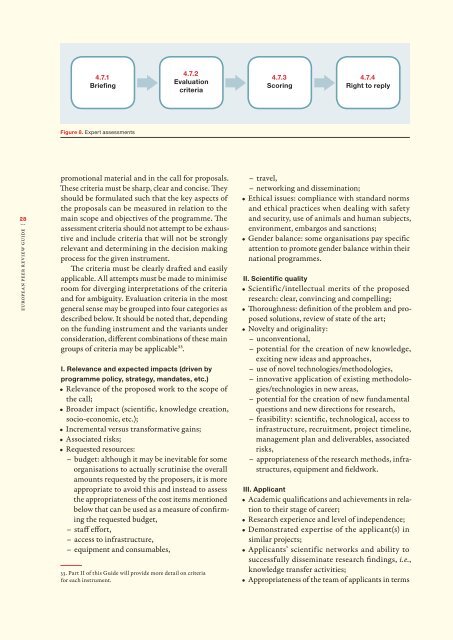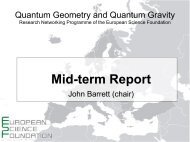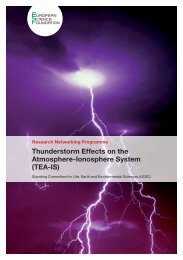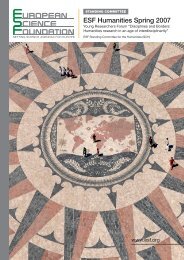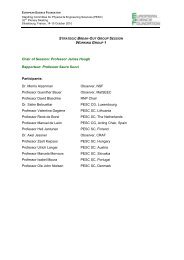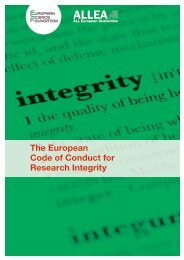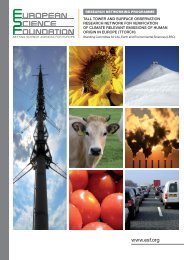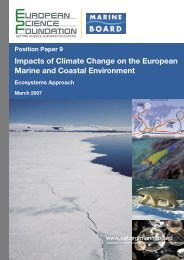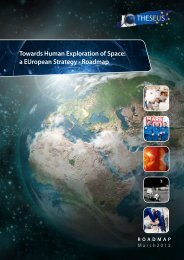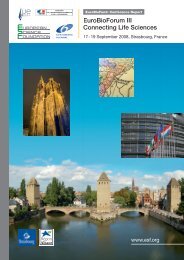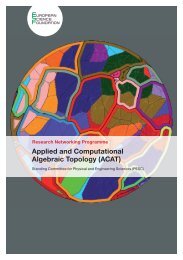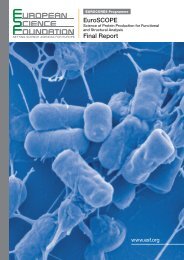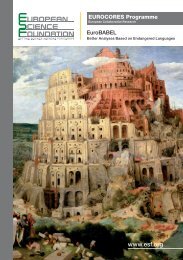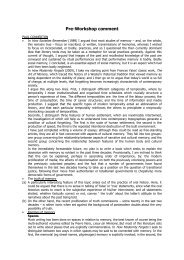European Peer Review Guide - European Science Foundation
European Peer Review Guide - European Science Foundation
European Peer Review Guide - European Science Foundation
Create successful ePaper yourself
Turn your PDF publications into a flip-book with our unique Google optimized e-Paper software.
4.7.1<br />
Briefing<br />
† †<br />
4.7.2<br />
Evaluation<br />
criteria<br />
4.7.3<br />
Scoring<br />
†<br />
Right<br />
4.7.4<br />
to reply<br />
Figure 8. Expert assessments<br />
28<br />
<strong>European</strong> <strong>Peer</strong> <strong>Review</strong> <strong>Guide</strong><br />
promotional material and in the call for proposals.<br />
These criteria must be sharp, clear and concise. They<br />
should be formulated such that the key aspects of<br />
the proposals can be measured in relation to the<br />
main scope and objectives of the programme. The<br />
assessment criteria should not attempt to be exhaustive<br />
and include criteria that will not be strongly<br />
relevant and determining in the decision making<br />
process for the given instrument.<br />
The criteria must be clearly drafted and easily<br />
applicable. All attempts must be made to minimise<br />
room for diverging interpretations of the criteria<br />
and for ambiguity. Evaluation criteria in the most<br />
general sense may be grouped into four categories as<br />
described below. It should be noted that, depending<br />
on the funding instrument and the variants under<br />
consideration, different combinations of these main<br />
groups of criteria may be applicable33.<br />
I. Relevance and expected impacts (driven by<br />
programme policy, strategy, mandates, etc.)<br />
• Relevance of the proposed work to the scope of<br />
the call;<br />
• Broader impact (scientific, knowledge creation,<br />
socio-economic, etc.);<br />
• Incremental versus transformative gains;<br />
• Associated risks;<br />
• Requested resources:<br />
– budget: although it may be inevitable for some<br />
organisations to actually scrutinise the overall<br />
amounts requested by the proposers, it is more<br />
appropriate to avoid this and instead to assess<br />
the appropriateness of the cost items mentioned<br />
below that can be used as a measure of confirming<br />
the requested budget,<br />
– staff effort,<br />
– access to infrastructure,<br />
– equipment and consumables,<br />
33. Part II of this <strong>Guide</strong> will provide more detail on criteria<br />
for each instrument.<br />
– travel,<br />
– networking and dissemination;<br />
• Ethical issues: compliance with standard norms<br />
and ethical practices when dealing with safety<br />
and security, use of animals and human subjects,<br />
environment, embargos and sanctions;<br />
• Gender balance: some organisations pay specific<br />
attention to promote gender balance within their<br />
national programmes.<br />
II. Scientific quality<br />
• Scientific/intellectual merits of the proposed<br />
research: clear, convincing and compelling;<br />
• Thoroughness: definition of the problem and proposed<br />
solutions, review of state of the art;<br />
• Novelty and originality:<br />
– unconventional,<br />
– potential for the creation of new knowledge,<br />
exciting new ideas and approaches,<br />
– use of novel technologies/methodologies,<br />
– innovative application of existing methodologies/technologies<br />
in new areas,<br />
– potential for the creation of new fundamental<br />
questions and new directions for research,<br />
– feasibility: scientific, technological, access to<br />
infrastructure, recruitment, project timeline,<br />
management plan and deliverables, associated<br />
risks,<br />
– appropriateness of the research methods, infrastructures,<br />
equipment and fieldwork.<br />
III. Applicant<br />
• Academic qualifications and achievements in relation<br />
to their stage of career;<br />
• Research experience and level of independence;<br />
• Demonstrated expertise of the applicant(s) in<br />
similar projects;<br />
• Applicants’ scientific networks and ability to<br />
successfully disseminate research findings, i.e.,<br />
knowledge transfer activities;<br />
• Appropriateness of the team of applicants in terms


